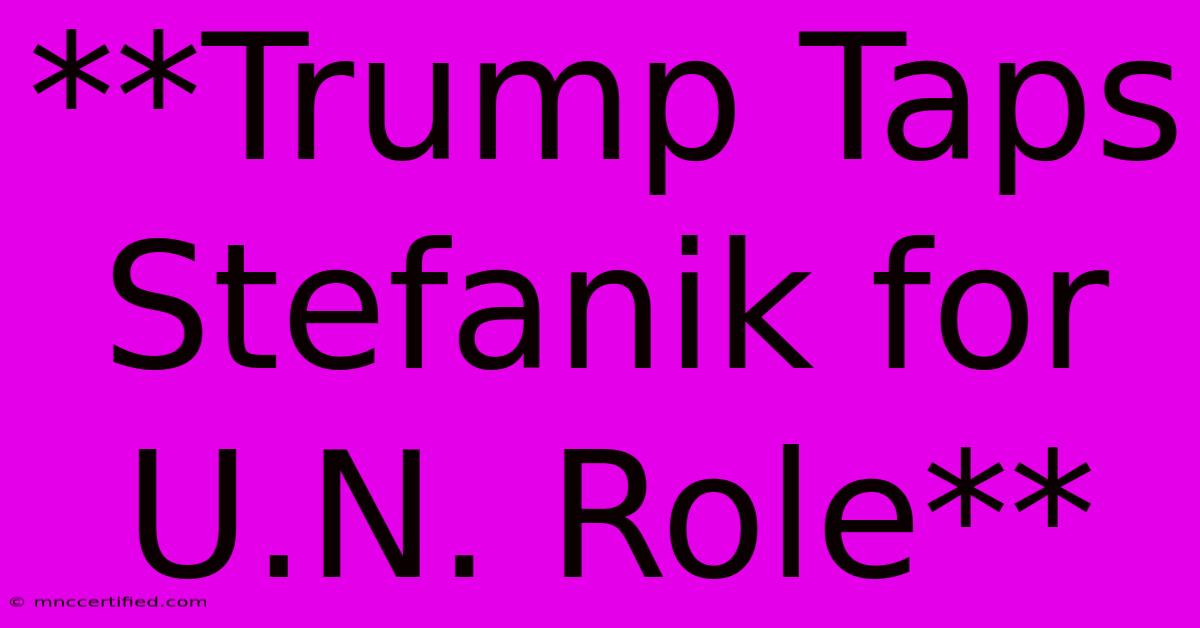**Trump Taps Stefanik For U.N. Role**

Table of Contents
Trump Taps Stefanik for U.N. Role: A Controversial Choice Sparks Debate
Former President Donald Trump has announced his intention to nominate Elise Stefanik, a Republican congresswoman from New York, to the position of U.S. Ambassador to the United Nations. The move, which comes amidst a flurry of other political developments, has sparked significant debate, with both praise and criticism pouring in from various quarters.
Stefanik's Background and Political Stance
Elise Stefanik, a 38-year-old rising star in the Republican Party, has served in the House of Representatives since 2015. She is known for her conservative views and staunch support for former President Trump. Stefanik quickly rose through the ranks, becoming the youngest woman to chair a major House committee when she assumed leadership of the House Republican Conference in 2021.
Her political trajectory has been marked by a strong emphasis on conservative policies, often aligning closely with Trump's agenda. Stefanik has been a vocal critic of the Biden administration, consistently challenging its policies on a range of issues, from immigration to foreign policy.
The Implications of Stefanik's Nomination
The nomination of Stefanik for the U.N. Ambassador role has ignited discussions about its implications for U.S. foreign policy and the future of the United Nations.
Proponents of Stefanik's nomination highlight her strong diplomatic skills and her unwavering support for American interests. They believe she will be a forceful advocate for U.S. values and priorities on the global stage.
Critics of the nomination argue that Stefanik's lack of foreign policy experience and her history of divisive rhetoric make her an ill-suited candidate for the position. They express concern that her appointment could damage U.S. relationships with other nations and undermine the U.N.'s role in promoting international cooperation.
The Future of U.S.-U.N. Relations
Stefanik's nomination comes at a time of increased scrutiny and debate regarding the United Nations' role in global affairs. Some argue that the organization has become too politicized and less effective in addressing critical challenges. Others maintain that the U.N. remains essential for fostering diplomacy and promoting international peace and security.
The outcome of Stefanik's nomination, including her potential confirmation by the Senate, will have significant implications for the future of U.S.-U.N. relations. Whether she is confirmed or not, the controversy surrounding her nomination highlights the ongoing debate about the role of the United States in the international arena.
Key Takeaways:
- Trump's nomination of Stefanik for the U.N. role is a significant political move that has sparked widespread discussion.
- Stefanik's background and political views, including her staunch support for Trump, have been central to the debate surrounding her nomination.
- The implications of Stefanik's potential appointment extend to U.S. foreign policy, the future of the United Nations, and the role of the United States in global affairs.
This situation is constantly evolving, and further developments regarding Stefanik's nomination and its potential impact on U.S. foreign policy are likely to emerge in the coming weeks and months.

Thank you for visiting our website wich cover about **Trump Taps Stefanik For U.N. Role**. We hope the information provided has been useful to you. Feel free to contact us if you have any questions or need further assistance. See you next time and dont miss to bookmark.
Featured Posts
-
Dental Bonding Cost For Front Teeth
Nov 12, 2024
-
How To Get Help With Cash Only Bond
Nov 12, 2024
-
New Michelle Trading Limited Website
Nov 12, 2024
-
Archbishop Welby Faces Resignation Calls
Nov 12, 2024
-
Tesla Stock Surges Musks 68 Billion Pay Package Approved
Nov 12, 2024